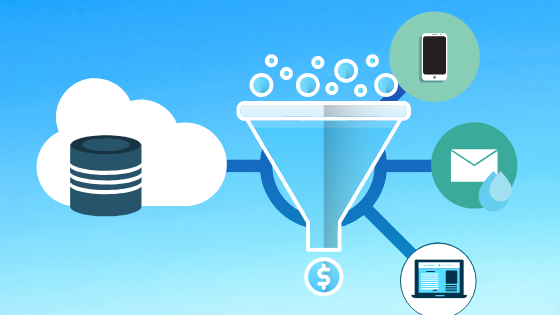Why Your CRM Should Have Marketing Automation
Does this sales vs. marketing conversation sound familiar?
Sales: “Marketing isn’t giving us enough leads and the ones we do have aren’t good.”
Marketing: “If you want more leads, we need a bigger marketing budget. Sales just needs to do a better job working the leads we give them.”
There is a way to stop the blame game – uniting your sales and marketing tools.. Bringing the two together increases the speed, power and alignment of sales and marketing. If your company could use less finger pointing and more hand holding between teams, it’s time to learn why your CRM needs a marketing automation tool..
Separate But Equal: Marketing Automation vs. CRM
Often companies think one application can do it all. However, while CRM and marketing automation are often thought of together, they have very different jobs.
Marketing automation serves as the engine for generating, qualifying and nurturing leads for the sales team. These tools streamline marketing efforts and collect data based on lead interactions across channels. Marketers use this information to tailor and personalize communication based on the qualities of the lead.
CRM, or customer relationship management, is a platform that helps manage sales opportunities so companies can convert marketing leads into paying customers. Marketing data feeds into the CRM to arm the sales team with in-depth information to better interact with leads. In the meantime, your CRM tracks prospective and current customer touchpoints and critical data, including buying behaviors.
To simplify things, marketing automation nurtures captured leads until they become sales-ready prospects. CRMs put the data to work to transition prospects into customers.
Made for Each Other: Marketing Automation Plus CRM
Bringing the two together creates powerful benefits for organizations, which is why so many businesses are adding marketing automation systems to their technology stack. Companies now spend more on marketing automation technology than advertising, accounting for 29% of their total marketing budget. What kind of results can be expected from that kind of investment?
- Alignment – Connecting marketing automation and CRM creates collective goals, metrics and deliverables between teams. The groups operate from the same value propositions and target segments. There is agreement on what constitutes a qualified lead. Most importantly, it allows the teams to share knowledge and results in real time. Companies that exceed revenue goals are 2.3 times more likely to report high levels of sales and marketing alignment.
- Efficiency – Automation distributes more marketing content faster across multiple channels. Automated systems can manage emails, web tracking, lead scoring, drip campaigns, forms, surveys, and landing pages simultaneously. The data collected helps sales set priorities. With 50% of sales time wasted on unproductive prospecting, data like click-through rates, website visits, and social interactions identifies hot leads. Doing more with less allows teams and companies to scale faster.
- Effectiveness – Marketing automation works to send the best message to the right person at the perfect time. Progressive profiling captures lead characteristics incrementally through multiple interactions. Messages then can be refined to better target the value propositions likely to resonate with the prospect. This hyper-personalization helps sales know the lead on a deeper level to deliver better relevancy and close deals. Nearly 60% of consumers say that personalization impacts their buying decisions.
- Analytics – Connected marketing automation and CRM platforms provide virtually unlimited reporting capabilities. They make it easy to measure and analyze efforts. Messaging quickly can be assessed through A/B testing and various channels tried. This leads to smarter spend by allocating the budget where it can deliver the greatest value. Perhaps most important, connected system data capabilities eliminate the “brick wall” historically up between sales and marketing by tying revenue and earned business to the teams collectively.
Better Together: Time to Integrate?
Clearly adding marketing automation and connecting it to your CRM delivers compelling results. However, with no shortage of priorities in business, it might be difficult to identify the right time for moving marketing automation to the top of the list. Start by asking the sales and marketing teams these 10 questions:
- Are we avoiding capturing and nurturing leads manually?
- Are we eliminating inefficient processes that force us to hire staff?
- Are we able to score leads and prioritize them in the sales cycle?
- Are we capturing enough qualified leads for sales to meet revenue goals?
- Are we effectively nurturing leads to make them sales-ready?
- Can we scale personalized communication within our current processes?
- Do we know how our leads are interacting with us?
- Can we accurately track marketing campaign effectiveness?
- Is marketing able to easily transition leads to sales?
- Do our teams have collective goals easily measured and discussed?
If you aren’t happy with the answers, it’s time to prioritize marketing automation on your technology roadmap.
Our Recommendation: Salesforce Sales Cloud with Pardot
To deliver a smarter buying experience for customers – both current and future – we recommend Sales Cloud with Pardot, Salesforce’s B2B marketing automation solution. Pardot offers website and social tracking, progressive profiling, lead scoring, and personalization management. The data generated syncs with Sales Cloud creating smooth lead transitions with real-time visibility. Sales Cloud represents the world’s most widely used CRM and when coupled with Pardot you place your sales and marketing processes in the same platform. Campaigns, sales and marketing dashboards, lead nurturing and automation are now in one place for your teams… Most importantly, the pairing makes pushing performance and assessing revenue impact as a unified team possible. Millions of Pardot users report a 40% increase in marketing productivity and a 25% reduction in the sales cycle. No other automation platform has the deep integration of Pardot with Salesforce Sales Cloud. Together they create a better sales funnel through superior marketing automation.
If marketing and sales alignment is your priority, Galvin Technologies is here to help. Let us show you how Salesforce with Pardot can help you answer “yes” the next time you ask your teams those 10 important questions.
Also published on Medium.
— Related Articles —
— Also on Galvin Tech —
Also published on Medium.














